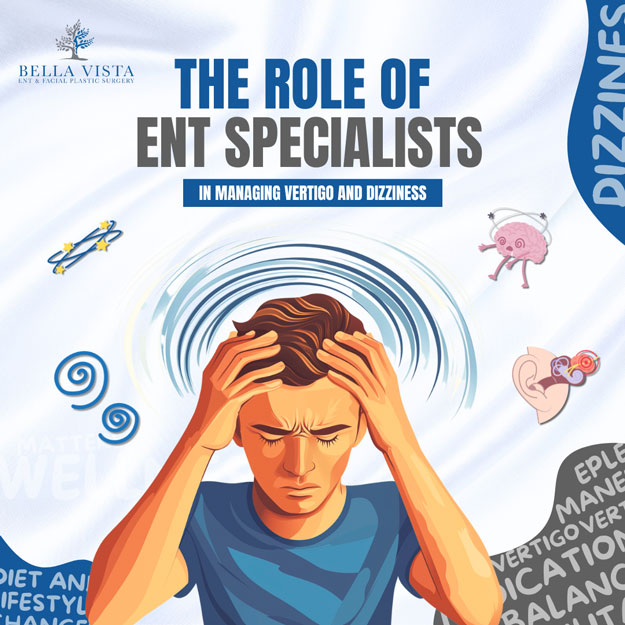The Role of ENT Specialists in Managing Vertigo and Dizziness
Dizziness is a common health concern, and when people refer to dizziness, they often describe feelings of faintness, light-headedness, and unsteadiness. Vertigo, a specific type of dizziness, creates the sensation that you or your surroundings are spinning. This condition, which is typically linked to issues with the inner ear, is often a symptom of a vestibular disorder—a condition affecting the vestibular system responsible for balance and eye movement.

Common Causes of Vertigo
Several factors can contribute to vertigo and dizziness, including:
- Benign Paroxysmal Positional Vertigo (BPPV): This occurs when calcium crystals in the inner ear become dislodged and fall into the wrong part of the semicircular canals, causing a spinning sensation.
- Meniere’s Disease: This is caused by the buildup of fluid in the inner ear, leading to dizziness and vertigo.
- Vestibular Neuritis: An inflammation of the inner ear that causes dizziness and vertigo.
- Neurological Disorders: Conditions like migraines or strokes can also lead to vertigo.
If you’re experiencing dizziness in the Thousand Oaks area, it’s important to consult with an experienced ENT specialist to pinpoint the underlying cause and receive effective treatment.
How Bella Vista ENT Can Help Manage Vertigo
Treatment for vertigo is highly dependent on its underlying cause. Here are some treatment options your ENT doctor at Bella Vista ENT in Thousand Oaks may recommend:
1. Medication
If vertigo is caused by fluid buildup in the inner ear, medications such as antihistamines, antibiotics, or oral steroids may help reduce inflammation and swelling. Motion sickness medications can also alleviate the spinning sensation and prevent nausea.
2. Balance Rehabilitation
Known as vestibular rehabilitation therapy (VRT), this treatment involves a series of exercises designed to improve balance by retraining the vestibular system. This therapy is especially useful for those who experience recurring vertigo episodes.
3. Epley Maneuver
The Epley maneuver is a series of head movements used to reposition displaced calcium crystals in the inner ear. This procedure, which your ENT specialist at Bella Vista ENT can perform, provides relief for many individuals with BPPV. The process only takes about 5–10 minutes and can be done in-office.
4. Diet and Lifestyle Changes
Depending on the root cause of your vertigo, your doctor may recommend adjusting your lifestyle:
- Stay hydrated by drinking plenty of fluids.
- Reduce your caffeine and alcohol intake to prevent dehydration and worsening symptoms.
- Avoid tobacco, as it can exacerbate dizziness.
- Practice stress management techniques to reduce anxiety, which can trigger dizziness.
- Move slowly, especially when turning your head to prevent dizziness.
5. Surgery
Surgery is typically only recommended as a last resort if other treatments fail. If vertigo is caused by a tumor or other structural issue in the ear, your doctor may suggest surgery to address the issue and restore balance.
When to Seek Help from Bella Vista ENT
While vertigo itself isn’t usually a cause for serious concern, if it has become frequent, persistent, or is impacting your ability to carry out everyday tasks, it’s time to see an expert. Bella Vista ENT in Thousand Oaks can provide a comprehensive evaluation and personalized treatment plan to address your vertigo symptoms.
If dizziness or vertigo is affecting your quality of life, don’t wait. Contact us today to schedule a consultation with one of our expert ENT specialists in Thousand Oaks.


